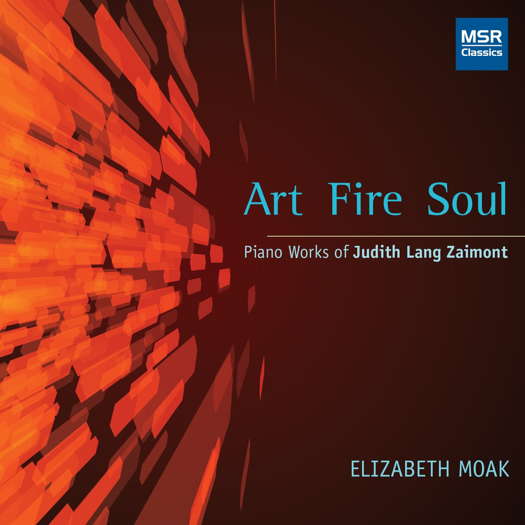- OxRecs Digital
- Rachel Barton Pine
- Vienna State Opera
- Park Lane Group
- Giacinto Scelsi
- Moscow State Conservatoire
- EMI
- Spokane
 DISCUSSION: What is a work? John Dante Prevedini leads a discussion about The performing artist as co-creator, including contributions from Halida Dinova, Yekaterina Lebedeva, Béla Hartmann, David Arditti and Stephen Francis Vasta.
DISCUSSION: What is a work? John Dante Prevedini leads a discussion about The performing artist as co-creator, including contributions from Halida Dinova, Yekaterina Lebedeva, Béla Hartmann, David Arditti and Stephen Francis Vasta.
 SPONSORED: CD Spotlight. An Encyclopedic Recital - Elizabeth Moak plays Judith Lang Zaimont, heard by the late Howard Smith.
SPONSORED: CD Spotlight. An Encyclopedic Recital - Elizabeth Moak plays Judith Lang Zaimont, heard by the late Howard Smith.
All sponsored features >>
Judith Weir
British composer Judith Weir was born in Cambridge to Scottish parents on 11 May 1954, studying a little with John Tavener whilst she was still at school, and playing oboe with the National Youth Orchestra of Great Britain. At Cambridge she studied with Robin Holloway, and also attended the Tanglewood Summer School for studies with Gunther Schuller.
Weir's musical language is conservative, and she has the knack (similar to Benjamin Britten) of making simple ideas appear mysterious. Best known for her operatic and theatre work, often inspired by medieval history and Scottish traditional culture, she is also recognised for her orchestral, chamber and more recently choral music.
She has held positions as artistic director of the Spitalfields Festival (1995-2000) and composer in association with the City of Birmingham Symphony Orchestra (1995-98). She has also written music for the Boston Symphony, the BBC Symphony Orchestra and the Minnesota Orchestra. in 2008 she was the subject of a BBC composer weekend at London's Barbican Centre. She has also taught as a visiting professor at Cardiff, Harvard and Princeton.
In 1997 she received the Lincoln Center's Stoeger Prize and in 2001 the South Bank Show music award. In 2007 she received the Queen's Medal for Music, and on 29 June 2014 she became the UK's Master of the Queen's Music.
Further information: judithweir.com
A selection of articles about Judith Weir
Spotlight. A Heartwarming Programme - Gerald Fenech strongly recommends choral music by John Rutter and other contemporary composers. 'Expressive performances from a choir at the top of its powers.'
Classical music news. January 2025 Newsletter - Watch and listen to our January 2025 video newsletter - Music and the Visual World
Classical music news. Imogen Holst and John McCabe - News of a rediscovered concerto and a new book
Richly-designed and original - Roderic Dunnett looks forward to the Three Choirs Festival, 27 July - 4 August 2024 in Worcester, UK
A Treasure Trove - Roderic Dunnett explores the substantial catalogue of Regent Records
CD Spotlight. A Distinctive Scottish Flavour - Geoff Pearce listens to chamber music and songs by Judith Weir. '... a fantastic disc ...'
Ensemble. Packed With Good Things - Roderic Dunnett reports from the 2019 Three Choirs Festival in Gloucester
Vividly Projected - Mike Wheeler listens to J S Bach, Gustav Holst, George Dyson, David Bednall, Edward Bairstow, César Franck, Purcell Mansfield, Judith Weir and Marcel Dupré, played by organist Sachin Gunga
Classical music news. Rosalie Coopman - Brixworth Music Festival announces the winner of its International Competition for Women Composers
Ensemble. Expressive Presence - Mendelssohn, Mozart, Judith Weir and Beethoven from Derby Concert Orchestra, heard by Mike Wheeler
CD Spotlight. Elliptical Orbits - String quartets by British composers, heard by the late Howard Smith. '... the Kreutzer Quartet brings a faultless degree of unanimity and understanding to this selection of late twentieth century string music.'
CD Spotlight. A Smash Hit - Music for Advent from choir and saxophone, recommended by Gerald Fenech. '... beautifully shaped in both the renaissance and contemporary repertoire ...'
CD Spotlight. Vibrant Testimony - Music inspired by the Virgin Mary, recommended by Gerald Fenech. '... overflowing with a translucent beauty ...'
Ensemble. Celebratory and Ambiguous - Mozart, Judith Weir and Ravel from the Lawson Trio at Buxton, heard by Mike Wheeler
CD Spotlight. Highly Recommended - Music for Advent intrigues Gerald Fenech. '... one of the discs of the year as far as choral music is concerned ...'
Ensemble. Invigorating Performance - Sinfonia Viva plays Judith Weir, heard by Mike Wheeler
Ensemble. Exciting Times Ahead - Haydn, Beethoven and Judith Weir from Sinfonia Viva, reviewed by Mike Wheeler
Ensemble. Rebuilt City - Malcolm Miller enjoys the first performance of Judith Weir's choral-orchestral work, 'Concrete'
Ensemble. Story Telling - Robert Hugill was at London's recent Judith Weir weekend

